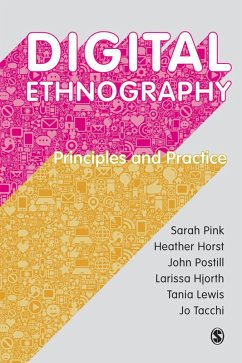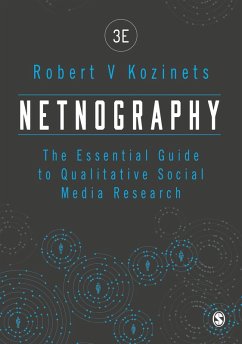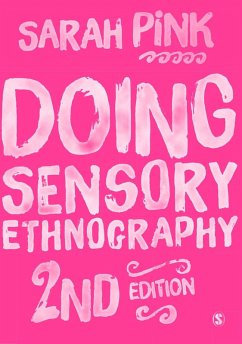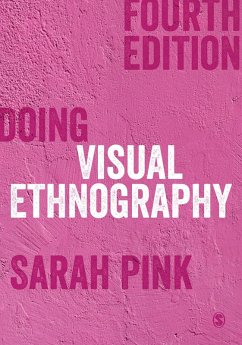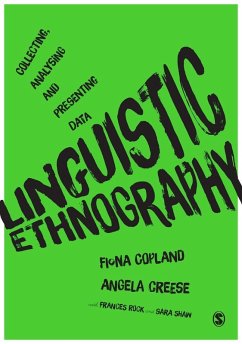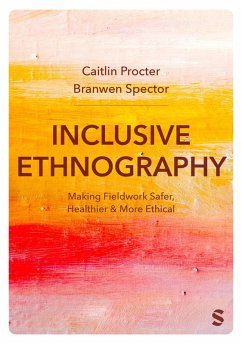
Handbook of Ethnography (eBook, PDF)
Versandkostenfrei!
Sofort per Download lieferbar
88,95 €
inkl. MwSt.
Weitere Ausgaben:

PAYBACK Punkte
44 °P sammeln!
`I wish the Handbook of Ethnography had been available to me as a fledgling ethnographer. I would recommend it for any graduate student who contemplates a career in the field. Likewise for experienced ethnographers who would like the equivalent of a world atlas to help pinpoint their own locations in the field, the Handbook of Ethnography is it' - Journal of Contemporary Ethnography`This wonderful Handbook establishes the central, and complex place ethnography now occupies in the human disciplines. All future work will begin here' - Norman K Denzin, University of Illinois, Urbana-Champaign`A m...
`I wish the Handbook of Ethnography had been available to me as a fledgling ethnographer. I would recommend it for any graduate student who contemplates a career in the field. Likewise for experienced ethnographers who would like the equivalent of a world atlas to help pinpoint their own locations in the field, the Handbook of Ethnography is it' - Journal of Contemporary Ethnography
`This wonderful Handbook establishes the central, and complex place ethnography now occupies in the human disciplines. All future work will begin here' - Norman K Denzin, University of Illinois, Urbana-Champaign
`A marvellous achievement! The Handbook has all the marks of a winner - compelling writing, comprehensive coverage and very useful discussions. This is a real benchmark for ethnography. It will set the background for debate and point to new directions for years to come. My graduate students will love it' - Jaber F Gubrium, University of Florida, Gainesville
`The Handbook of Ethnography compiles invaluable, original, critical essays on ethnographic work, earning it a place on everyone's must-have bookshelf' - Virginia Olesen, University of California, San Francisco
`The Handbook is a remarkable synthesis of existing thinking in and around ethnography' - Forum for Qualitative Social Research - follow the link below to read the complete review
`No self-respecting qualitative researcher should be without Paul Atkinson (et al's) handbook on ethnography. This really is encyclopaedic in concept and scope. Many "big names" in the field have contributed so this has to be the starting point for anyone looking to understand the field in substantive topic, theoretical tradition and methodology. The chapters on visual ethnography and semiotics expand the field marvellously, while those on field notes and on ethics are accomplished surveys of the field' - SRA News
Ethnography is one of the chief research methods in sociology, anthropology and other cognate disciplines in the social sciences. This Handbook provides an unparalleled, critical guide to its principles and practice.
The volume is organized into three sections. The first systematically locates ethnography firmly in its relevant historical and intellectual contexts. The roots of ethnography are pinpointed and the pattern of its development is demonstrated.
The second section examines the contribution of ethnography to major fields of substantive research. The impact and strengths and weaknesses of ethnographic method are dealt with authoritatively and accessibly.
The third section moves on to examine key debates and issues in ethnography, from the conduct of research through to contemporary arguments.
The result is a landmark work in the field, which draws on the expertise of an internationally renowned group of interdisicplinary scholars. The Handbook of Ethnography provides readers with a one-stop critical guide to the past, present and future of ethnography. It will quickly establish itself as the ethnographer's bible.
`This wonderful Handbook establishes the central, and complex place ethnography now occupies in the human disciplines. All future work will begin here' - Norman K Denzin, University of Illinois, Urbana-Champaign
`A marvellous achievement! The Handbook has all the marks of a winner - compelling writing, comprehensive coverage and very useful discussions. This is a real benchmark for ethnography. It will set the background for debate and point to new directions for years to come. My graduate students will love it' - Jaber F Gubrium, University of Florida, Gainesville
`The Handbook of Ethnography compiles invaluable, original, critical essays on ethnographic work, earning it a place on everyone's must-have bookshelf' - Virginia Olesen, University of California, San Francisco
`The Handbook is a remarkable synthesis of existing thinking in and around ethnography' - Forum for Qualitative Social Research - follow the link below to read the complete review
`No self-respecting qualitative researcher should be without Paul Atkinson (et al's) handbook on ethnography. This really is encyclopaedic in concept and scope. Many "big names" in the field have contributed so this has to be the starting point for anyone looking to understand the field in substantive topic, theoretical tradition and methodology. The chapters on visual ethnography and semiotics expand the field marvellously, while those on field notes and on ethics are accomplished surveys of the field' - SRA News
Ethnography is one of the chief research methods in sociology, anthropology and other cognate disciplines in the social sciences. This Handbook provides an unparalleled, critical guide to its principles and practice.
The volume is organized into three sections. The first systematically locates ethnography firmly in its relevant historical and intellectual contexts. The roots of ethnography are pinpointed and the pattern of its development is demonstrated.
The second section examines the contribution of ethnography to major fields of substantive research. The impact and strengths and weaknesses of ethnographic method are dealt with authoritatively and accessibly.
The third section moves on to examine key debates and issues in ethnography, from the conduct of research through to contemporary arguments.
The result is a landmark work in the field, which draws on the expertise of an internationally renowned group of interdisicplinary scholars. The Handbook of Ethnography provides readers with a one-stop critical guide to the past, present and future of ethnography. It will quickly establish itself as the ethnographer's bible.
Dieser Download kann aus rechtlichen Gründen nur mit Rechnungsadresse in A, D ausgeliefert werden.





